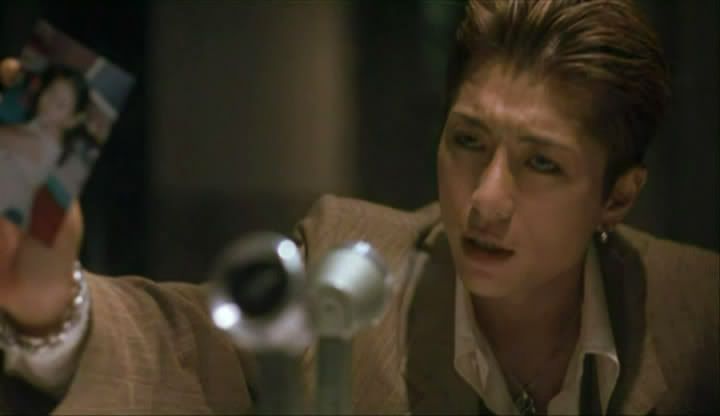Two thieves, Sho (GACKT) and Kei (HYDE) are best friends living in the crime infested province of Mallepa. Doing what they have to in order to survive, Sho soon comes to desire more from life and longs to move up in the world. Living in a world where the number of guns determines the law, Sho and Kei will find that the price of success is one few men can afford to pay.
In addition to following the individual stories Sho and Kei, Moon Child also explores Mallepa's criminal underworld and how it affects the culture of the world these characters inhabit. lay in how the criminal underworld in Mallepa works. Although the setting of Moon Child is strikingly beautiful, and the tone is humorous at times, these elements are used to contrast the heavy drama and grim mood of this film. Our lead characters aren't exactly good guys as they regularly engage in acts of theft and murder. On the one hand this is the kind of life people in Mallepa are driven to pursue. On the other hand, our heroes in this story don't appear to be in any rush to rise above the life.
Moon Child was written by Gackt and really showed how his creativity is not limited to his music. The film does an admirable job of following the lives of several characters trying to grow and survive in a city where the only law is survival of the fittest. While Sho and Kei are the main characters, their stories intertwine with several others. What is impressive here is that even characters occupying the periphery are well-developed and their motivations are believable, albeit morally depraved for some. With Gackt at the helm the script also explores numerous social problems that you wouldn't expect from a typical crime drama. Rather than focus entirely on personal relations in this drama, Moon Child explores issues of poverty, immigration, and anomie. It also provides food for thought by exploring those variables which lead some people into a life of crime. Also interesting is that the movie doesn't glorify thug life and instead makes a point to portray what happens to people who go down that road.
The acting in this film is fantastic! Many of those unfamiliar with J-Rock superstars Gackt and Hyde wondered if either of them could actually act on film. Yes, yes they can. Both stars bring the same emotional intensity and captivating persona often seen through their music, cementing in many ways that the two are artists who are not defined by one particular medium. In an interesting approach, the movie also took the two rock stars out of their natural element where their personalities are concerned. Gackt tends to be reserved in real life but his character is completely different from himself. Sho is outgoing, unpredictable, and extremely hot-blooded. If we look at Hyde who is more outgoing and typically less reserved, we find that in Kei he is playing a character who is very guarded, and does not express himself in any particularly visible manner. In an interesting dynamic it is almost as though Gackt and Hyde exchanged personalities to play characters who are their polar opposites and that takes a considerable amount of experience that many actors take years to build. Anne Suzuki has a small role in the movie but she proves that it's not the size of the part but the size of the performance. Suzuki's screen-time is very small but it's one of the most well-done scenes in the film as Suzuki is no stranger to the art of conveying a lot while saying very little.




No comments:
Post a Comment